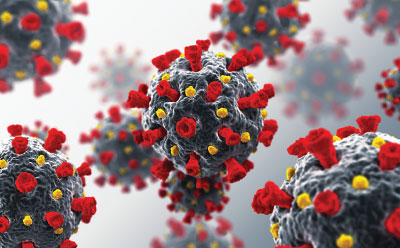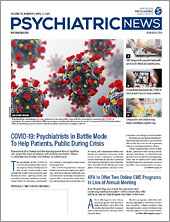The onslaught of the COVID-19 coronavirus pandemic has caused an unprecedented disruption of life in the United States and around the world. Even as schools and businesses close, sporting events are cancelled, and entire industries are suddenly bereft of customers, the health care system is bracing for more waves of new patients.
The COVID-19 pandemic contains within it more than a respiratory infection. Infectious disease outbreaks also can have short- and long-term psychological effects on patients, their families, the health professionals who care for them, and communities where outbreaks are reported. Survivors of the severe acute respiratory syndrome (SARS) outbreak in Asia and Canada in 2003 reported elevated rates of psychiatric disorders both during the acute phase of the pandemic and up to four years later, according to several studies.
Psychiatrists and mental health professionals must be ready to care for those affected by the virus as well as patients with pre-existing psychiatric illness.
“In the context of the COVID-19 pandemic, patients with existing mood, anxiety, psychotic, or substance use disorders are at risk of worsening symptoms due to added stress and could benefit from extra attention as soon as possible,” Jon Levenson, M.D., an associate professor of psychiatry at Columbia University and chair of APA’s Council on Consultation-Liaison Psychiatry, told Psychiatric News. Ensuring that patients have continued access to their medications is equally important.
“Patients with COVID-19 may need a formal psychiatric consult and care for anxiety related to their isolation and uncertainty about the course of their illness,” said Levenson, who usually works with cancer patients and others with serious physical illnesses.
Health care professionals should remind patients to obtain the latest information from reliable sources, such as the Centers for Disease Control and Prevention and the World Health Organization, and limit exposure to media coverage of the outbreak, Joshua Morganstein, M.D., chair of APA’s Committee on the Psychiatric Dimensions of Disasters, said in an email. “It is essential to understand how any given patient will most effectively receive information and tailor communication and interventions using a patient-centered approach.”
Prepare for the Long Haul
Psychiatrists must be up to date on all aspects of the coronavirus outbreak to combat the stigma associated with the disease, he added. (His hospital holds a daily briefing at 10 a.m. to keep staff current.) They may also need to learn some new skills, like how to use protective gear or treat patients via telepsychiatry over computers or cell phones.
Steps to reduce transmission, like personal hygiene measures, remaining at home, or keeping children away from the elderly might help slow the rate of new infections and avoid overloading the health care system.
However, social distancing measures like quarantine, isolation, and travel restrictions intended to limit the spread of the disease may also contribute to depression, anxiety, and distress, said medical anthropologist Monica Schoch-Spana, Ph.D., a senior scholar at the Johns Hopkins Center for Health Security and senior scientist in the Department of Environmental Health and Engineering at the Johns Hopkins Bloomberg School of Public Health.
“The pandemic will be protracted, so the psychological impacts will be long lasting,” said Schoch-Spana in an interview. Much is still unknown. “This is a novel pathogen, with no specific medications for treatment, limited scientific knowledge about it, and lots of uncertainty as to its course, so it’s no wonder there is much distress. Clinicians are learning as they go along.”
Much of the advice to the public has been valuable but one sided, said Schoch-Spana. Promoting handwashing and advising the frail elderly to stay at home make sense, but such advice should be coupled with suggestions for social connection as well as social distancing. For example, family, neighbors, and friends can be urged to check in with people sequestered at home to see if they need help—or just a little companionship.
“Also, as people in health care work longer or extra shifts, they could ask neighbors to look in on their families while they are at work,” she said. “Employee assistance plans in the health care sector should be sensitive to the extra stress during the epidemic. We need to get through the contagion together.”
Getting through COVID-19 may be an uneven experience, said Judith Bass, Ph.D., an associate professor at the Johns Hopkins Bloomberg School of Public Health. “The current pandemic shines a light on the inequities in health care access and the urban/rural divide.”
Nevertheless, lessons learned from the SARS and the Ebola outbreaks may help hospitals in the United States prepare for outbreaks, she said. Clinicians in those epidemics couldn’t do much to help many of their patients, leaving them with a mixture of fear for their own infection and feelings of guilt. Many health care workers were also stigmatized as potential sources of infection in their home communities.
“Just being exposed to the virus puts you at risk for PTSD,” said Damir Huremovic, M.D., M.P.P., in an interview. He is an assistant professor of psychiatry at the Donald and Barbara Zucker School of Medicine at Hofstra/Northwell in Manhasset, N.Y., and editor of Psychiatry of Pandemics: A Mental Health Response to Infection Outbreak (Springer, 2019). “We have good knowledge from SARS regarding the effects on staff, survivors, and families, but every disease is different, and you can’t apply past experience as a blanket prescription.”
Inpatients should be a major concern, given the experience of a nursing home in Washington state, where 20 residents died, said Huremovic.
Clinicians Need Care as Well
Besides working long hours, clinicians are also at high risk for infection.
“Psychiatrists can play an important role in supporting all the physicians, nurses, social workers, rehab specialists, and people in the emergency department who are directly caring for COVID-19 patients,” said Levenson. He is already planning for a time when the number of those employees will be thinned by overwork or illness and is looking at ways to temporarily press psychiatrists from other specialties into working as C-L practitioners.
A massive onslaught of patients could lead to difficult clinical and ethical dilemmas, said Schoch-Spana. In Italy, which quarantined the entire country on March 9, the number of patients needing mechanical ventilators exceeded the number of available machines.
“Deciding who gets scarce resources will require making not just technical choices about who gets a ventilator, but moral choices as well,” she said. “Then imagine the mental state of the clinician who has to make that decision.”
Finally, public health experts fear that once the pandemic runs its course, urgency among the public and elected officials to prepare for the inevitable next outbreak will wane.
“When there’s no epidemic, people don’t want to be bothered. Then they panic when it arrives, and then they drift back into blissful amnesia,” said Huremovic.
Time will only tell if the severity of the COVID-19 pandemic will overcome that cycle of concern and complacency. ■

